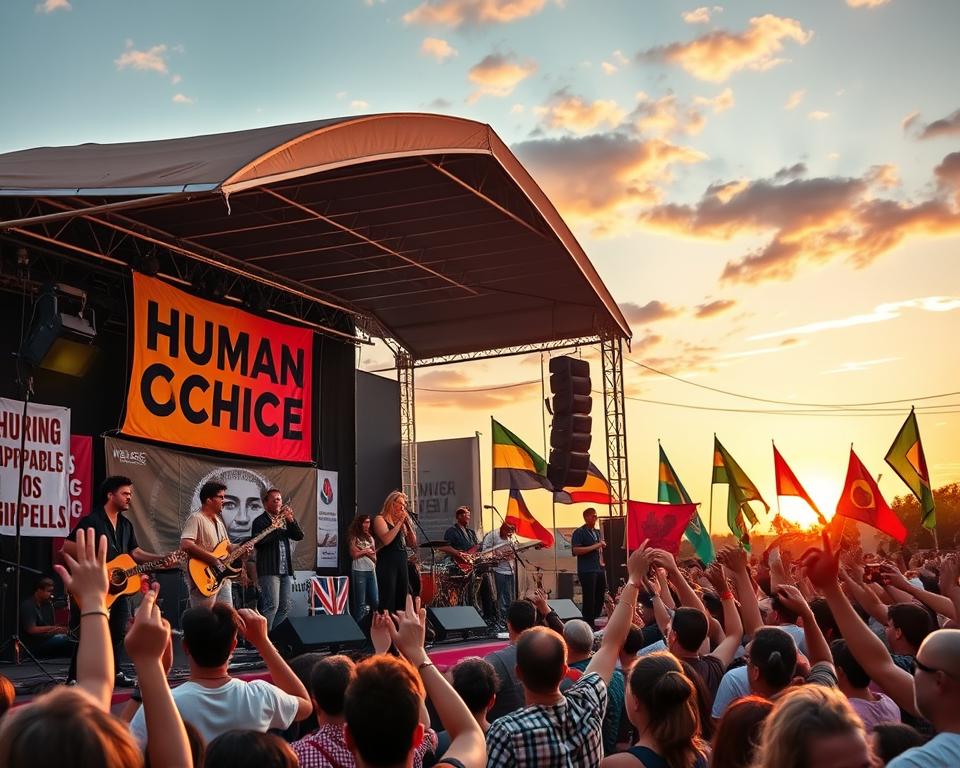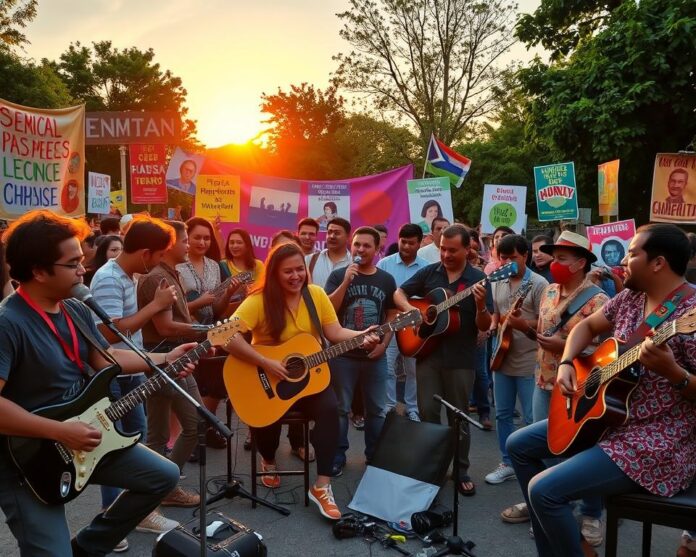In 1972, over 112,000 people gathered for the Wattstax music festival. It was a key moment in the American Civil Rights Movement. Music has always been a strong way to express feelings, bring people together, and inspire change.
Many artists use their music to speak out on social issues and fight for justice. This is a big part of making social change happen.
Protest songs like “Universal Soldier” and “Now That the Buffalo‘s Gone” tackle tough issues. They help bring about social change and encourage people to take action. Music has the power to touch our hearts, cross cultural lines, and bring us together for a common cause.
Music has been important in many social justice movements, from civil rights to today’s issues. Artists use their music to influence politics and push for progress. They use their platform to advocate for change and inspire others to do the same.
Understanding Activism in Music
Music has always been a strong voice for change. It can move people and unite them for a cause. The grassroots movement has used music to spread awareness and fight for human rights. From folk songs in the civil rights era to today’s hip-hop, music has shaped opinions and sparked action.
The history of music activism is rich and diverse. It includes the Robin Hood ballads from the 1400s and today’s hip hop. Political activism drives many musical movements. Artists use their songs to share feelings and push for change. Studies show 75% of artists let social issues influence their music, showing music’s big role in change.
Looking at music’s role in social change, we see human rights at the heart of many movements. Music has been key in anti-war efforts of the 1960s and 1970s and today’s movements like Black Lives Matter. It’s vital for social justice and political activism. Understanding music’s role in activism shows its power to inspire and bring about change.
The Historical Context of Musical Activism
Musical activism has a long history, starting with folk songs of the civil rights era and protest songs of the 1960s. These early efforts set the stage for today’s grassroots movement. Music remains a powerful tool for change.
Iconic Songs That Sparked Change
Music has always been a strong tool for change. Many songs have become symbols of different movements. For instance, “Imagine” by John Lennon and “Fight the Power” by Public Enemy stand for peace and equality.
In community organization, music has been key. Songs like “We Shall Overcome” and “Blowin’ in the Wind” have fueled social movements. They inspire people to act, creating unity and purpose for civil disobedience.
Amnesty International says music can motivate people to fight for human rights. Songs like “Get Up, Stand Up” by Bob Marley have become symbols of justice. Music helps individuals and groups push for a fairer world.
“Imagine” by John Lennon: A Call for Peace
Released in 1971, “Imagine” by John Lennon calls for peace and unity. Its message of a world without conflict has touched hearts worldwide. It’s a classic in social movements.
“Fight The Power” by Public Enemy: A Rallying Cry
“Fight the Power” by Public Enemy urges for social justice and equality. Its powerful lyrics and catchy tune have made it a favorite among activists. It continues to inspire action and empowerment.
“Alright” by Kendrick Lamar: Resilience in Struggle
“Alright” by Kendrick Lamar shows the strength of individuals and communities facing challenges. Its message of hope and defiance has become an anthem for social movements. Its impact is still felt today.
Genres That Amplify Activism
Music is a strong tool for social change. Different genres let artists share their feelings and fight for justice. Music’s effect on activism is clear, with many genres helping to push for advocacy and motivate people to act.
Folk music speaks for the people, rooted in old stories and comments on society. It has helped many social movements. Hip-hop, too, is a voice for change, with artists tackling big issues and pushing for advocacy.
Punk rock is also key in activism, known for its bold and defiant spirit. It encourages many to stand up against wrongs. These genres offer artists a way to share their views and influence public opinion, leading to social change.
Artists use their music to highlight social problems, encourage activism, and drive social change. Music’s role in activism shows the power of art to motivate and unite people. It’s a crucial tool for advocacy and will keep shaping public views and inspiring action.
The Role of Artists in Social Movements
Artists have always led social movements, using their art to highlight human rights and fight for justice. The grassroots movement has been key in driving change. Many artists tackle issues like racism, sexism, and inequality through their work.
Through their art, these individuals mobilize communities and draw attention to critical causes. This often sparks big political actions.

Case Studies: Artists as Activists
Keith Haring tackled the AIDS crisis with his art, while Banksy’s street art symbolizes hope and social campaigns. These artists show how art can inspire change and support human rights. They often team up with social movements to spread their message.
Collaborations and Impact: Music for Change
Music also plays a big role in social movements. Many artists use their music to raise awareness and rally communities. By working with other artists and activists, they create strong movements for change.
They blend grassroots movement and political activism into their music. Their work promotes human rights and inspires a new wave of activists.
The Future of Activism Through Music
Looking ahead, music’s role in sparking social and political change is as strong as ever.
New artists are stepping up, using their voices to highlight important issues and encourage people to get involved. Social media helps them reach out to fans all over the world. This connects people, building a sense of community and encouraging action.
Music events are key in activism today. They offer places for people to share their stories and work together for change. Whether it’s a concert for a cause or a rally, these events bring people together, breaking down barriers and starting important conversations.
The digital world is changing how music meets activism. We’re seeing artists and activists blend more than ever before. This mix has the power to bring about real change and give a voice to those who need it most.










